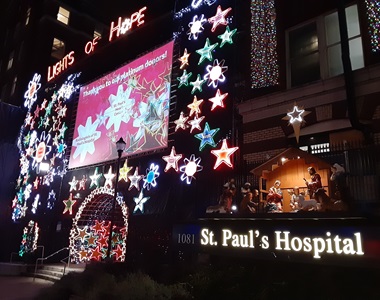
The Lights of Hope display, including the creche, will be in front of St. Paul’s Hospital until January 5.
Should the new St. Paul’s building accommodate MAiD [Medical Assistance in Dying]? Can city councils continue to open their deliberations with prayer? Does the Canada Summer Jobs granting process still discriminate against religious groups? What about public Christmas celebrations?
A number of current debates raise again the contentious issue of how church and state should work together.
Michael Van Pelt, President and CEO of Cardus, a non-partisan Christian public policy think tank, put it well in a recent email to supporters:
Merry Christmas is in and Happy Holidays is out . . . well, maybe not just yet.
Here is the irony: Canadians are in search of meaning, especially young Canadians, yet our public square leaders bleach meaning from our common life. For sure, Happy Holidays is a great deal, but it doesn’t match the cosmic meaning and purpose of Christmas.
But while Canadians seem to have chilled out about seasonal greetings, the push for a secular-only public space has morphed into different forms.
Following are some examples of ongoing controversies.
MAiD adjacent to St. Paul’s
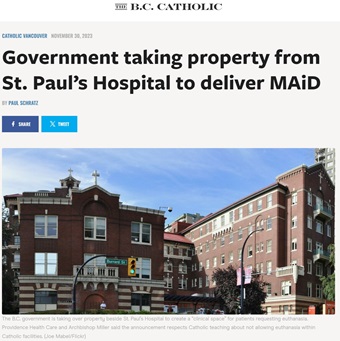 The provincial government and Providence Health Care (“a Catholic health care community” which operates several local hospitals and residences) have come to an agreement which appears to accommodate the province’s determination to offer euthanasia to patients and the commitment by the Catholic church (reiterated firmly by the Canadian Conference of Catholic Bishops November 30) not to allow such practices in their hospitals.
The provincial government and Providence Health Care (“a Catholic health care community” which operates several local hospitals and residences) have come to an agreement which appears to accommodate the province’s determination to offer euthanasia to patients and the commitment by the Catholic church (reiterated firmly by the Canadian Conference of Catholic Bishops November 30) not to allow such practices in their hospitals.
But many critics are not satisfied with the agreement.
An article in The B.C. Catholic stated:
[The November 29] announcement appears to be a workaround in which the government takes land next to the hospital and sets up its own euthanasia site through Vancouver Coastal Health.
The government said the “clinical space” will be staffed by Vancouver Coastal Health staff and be connected by a corridor to St. Paul’s. Patients who want MAiD will be discharged from the hospital and transferred to the care of Vancouver Coastal Health. The new site is expected to be completed in August 2024.
“While faith-based organizations may opt not to offer MAiD services at their facilities, they are expected to work with regional health authorities to ensure the option is available to patients who choose it,” the ministry said in its announcement.
Archbishop J. Michael Miller said the government’s directive “respects and preserves Providence’s policy of not allowing MAiD inside a Catholic health care facility,” and the new patient discharge and transfer protocols are consistent with existing arrangements for transferring patients from its other hospice and palliative care sites, St. John Hospice, May’s Place.
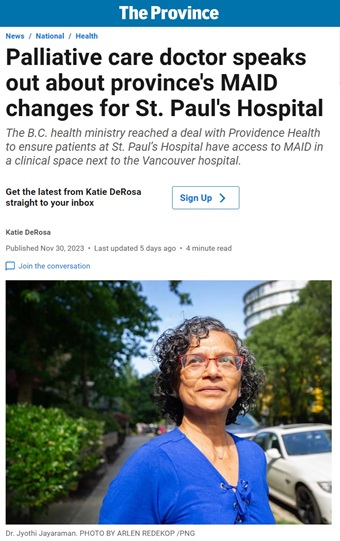 An article in The Province described serious opposition the the agreement:
An article in The Province described serious opposition the the agreement:
“I’m actually shocked,” said Jyothi Jayaraman, who quit her job at a Vancouver hospice, May’s Place, because it stopped providing MAID once it was taken over by Providence Health. “I thought, ‘Is this the outcome?’ There is no concession. No acknowledgment of patient suffering.” . . .
Jayaraman said the workaround at St. Paul’s Hospital doesn’t address the continuing forced transfers at hospitals and hospices run by Providence Health and other religious health groups that oppose MAID.
Providence Health received $859 million in public funding in 2022-23 to operate nine hospitals, long-term care facilities and hospices including St. Paul’s, Mount Saint Joseph Hospital, Holy Family Hospital, Youville Residence, St. John Hospice, May’s Place and three branches of care homes under St. Vincent’s. . . .
Daphne Gilbert, a University of Ottawa law professor, said Dix’s announcement Wednesday doesn’t change the constitutional court challenge she and other advocates are working on against B.C.’s Master Agreement that allows Providence Health to opt out of providing MAID.
“I think it’s time to take a stand,” Gilbert said. “These are publicly funded institutions with religious traditions, yes, but those traditions can’t overcome the proper approach to health care.”
BC Humanists
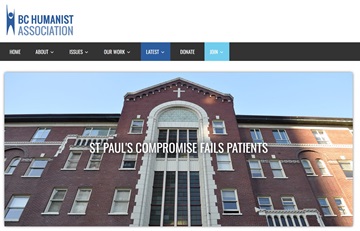 Among those unhappy with the St. Paul’s agreement are the BC Humanist Association. They added their voice the very day of the announcement in ‘St Paul’s compromise fails patients’:
Among those unhappy with the St. Paul’s agreement are the BC Humanist Association. They added their voice the very day of the announcement in ‘St Paul’s compromise fails patients’:
The BC Humanist Association is calling a new policy that requires patients seeking medical assistance in dying (MAID) at a publicly-funded Catholic Hospital in downtown Vancouver “demeaning and dehumanizing.”
They oppose the accommodation of religious practices on quite a number of fronts. The Province posted ‘Humanist association calls out seven B.C. municipalities for violating ‘duty’ of religious neutrality’ November 17:
When Vancouver Mayor Ken Sim and the rest of the city’s newly elected council members were sworn in last November at the Orpheum Theatre, five leaders of Christian, Jewish, Sikh and Muslim faiths were invited to participate in the inaugural ceremony.
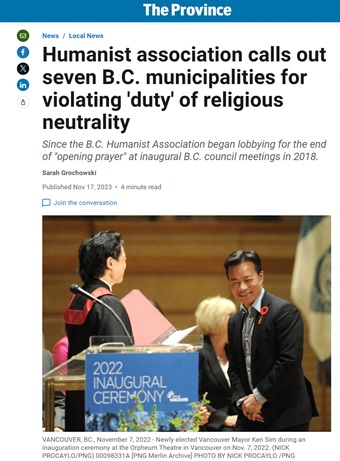 One of them, Roman Catholic deacon Richard Chau, recited a Bible verse. “What does the Lord require of you? To act justly, and to love mercy, and to walk humbly with your God.”
One of them, Roman Catholic deacon Richard Chau, recited a Bible verse. “What does the Lord require of you? To act justly, and to love mercy, and to walk humbly with your God.”
Vancouver was one of seven municipalities called out by the B.C. Humanist Association this week for invoking prayers in their inaugural 2022 meetings in violation of the state’s “duty” of religious neutrality.
The other cities were Delta, West Kelowna, Belcarra, Colwood, Parksville and Tumbler Ridge.
Ian Bushfield, the association’s executive-director, said while the city’s inaugural ceremony involved leaders from multiple faiths, that approach “still failed to meet the diversity of the city.”
Bushfield cited 2021 census data that showed a majority of Vancouver residents – 56 per cent – identified as non-religious.
Here are a few recent headlines from the BC Humanist site:
- Dec 5: Belcarra council agrees to end prayers in special meetings
- Nov 30: New bill would end religious exemptions to hate speech laws
- Nov 15: We yelled at them until they stopped: revisiting prayers in BC municipal council meetings and the power of secular advocacy
- Nov 7: Chaplain General decision to pause inclusive policy discriminates against atheist veterans
- Nov 2: Colwood councillor calls for end to religious property tax exemptions
- Oct 24: No CSJ [Canada Summer Jobs] funding for anti-human rights organizations
- Sept 27: Religious organizations should be subject to the privacy act
- Aug 8: The supremacy of God and the rule of law
Canada Summer Jobs
 In alerting its members about applications for Canada Summer Jobs, the Canadian Council for Christian Charities (CCCC) has promised they “will closely monitor whether and how these new and modified clauses impact faith-based organizations’ CSJ applications.”
In alerting its members about applications for Canada Summer Jobs, the Canadian Council for Christian Charities (CCCC) has promised they “will closely monitor whether and how these new and modified clauses impact faith-based organizations’ CSJ applications.”
The reason for such close attention is that the Liberal government had imposed a ‘values test’ which would have prevented some Christian (and other) groups from applying or being accepting for the program.
In a November 28 post, CCCC Director of Legal Affairs Deina Warren reviewed the current application process. She concluded (in part):
We trust that the new category of ineligible applicants will not be used so as to exclude more faith-based organizations; however, it does beg the question, what purpose will it serve?
It seems that it may be used to justify an expanded ability for ESDC [Employment and Social Development Canada] staff to look beyond the job or job activities: does the organization engage in activities that “directly or indirectly infringe, undermine, weaken or restrict the exercise of human rights legally protected in Canada,” regardless of the job role and activities?
Immediate questions arise:
-
- What does “infringe” mean?
- What does “indirectly” mean?
- What does “weaken” mean?
- How will protected rights of expression, association, and conscience be addressed in the assessment process?
- What standard is applied for each of these? . . .
As with every year since the 2018 Attestation controversy, we know that faith-based organizations’ applications have been rejected for a variety of reasons, including statements of faith that adhere to a biblical definition of marriage, where all staff agree to sign statements of faith, and other similar reasons. We also know that many religious organizations successfully apply for CSJ funding.
Presumably we will continue to see a variety of outcomes. Perhaps even to a greater degree as it seems more subjective elements have been introduced into the 2024 Application requirements.
Go here for the full comment, including suggestions for future action. And here for related stories on this site.
Christmas
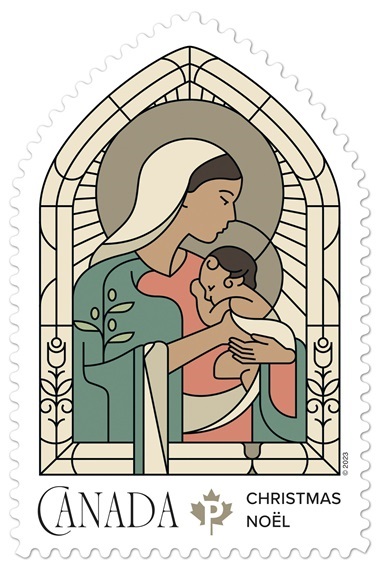
Vancouver artist Adrian
As Van Pelt said, It appears to be safe to voice ‘Merry Christmas’ in public again (despite a saying among BC Humanists “that axial tilt is the true reason for the season”}.
As was pointed out in a recent National Post article:
A Leger poll from last year asked Canadians who grew up non-Christian whether they were offended by the greeting “Merry Christmas.” Of respondents, 92 per cent said “no.”
That same poll also asked Canadians of all religions whether Christmas and other “religious” holidays should be struck from the country’s official statutory holidays. Only six per cent said “yes.”
It should be noted, though, that this point was made toward the end of a comment by Tristin Hopper titled “Federal Commission declares Christmas holiday is ‘religious intolerance.'” The subtitle: “The Canadian Human Rights Commission, which wields broad quasi-judicial powers, argued that a day off on Christmas is ‘discriminatory.’”
However, things are looking up, as I noted last week in an article about the Madonna and Child Canada Post stamp and this week, in the accompanying story about the Dundarave Festival of Light / Christmas celebrations.
Other issues
 There have been many issues relating to the proper balancing of religious belief/action and secular/state powers over the past few years, from opposition to the proposed Trinity Western law school to Quebec’s Bill 21, described by the Canadian Civil Liberties Association as “a horrendous law that violates human rights and harms people who are already marginalized.”
There have been many issues relating to the proper balancing of religious belief/action and secular/state powers over the past few years, from opposition to the proposed Trinity Western law school to Quebec’s Bill 21, described by the Canadian Civil Liberties Association as “a horrendous law that violates human rights and harms people who are already marginalized.”
Van Pelt mentions a couple of current ones:
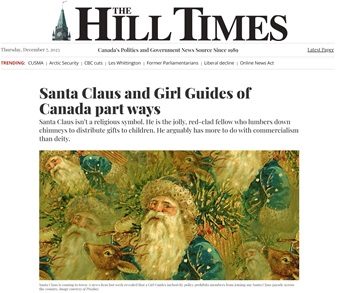 Girl Guides of Canada banning participation in Santa Claus parades because the Guides are a secular and inclusive organisation and therefore can’t do anything that would, in their view, promote a “religious practice” that some members may not accept.
Girl Guides of Canada banning participation in Santa Claus parades because the Guides are a secular and inclusive organisation and therefore can’t do anything that would, in their view, promote a “religious practice” that some members may not accept.- The chaplain general of the Canadian Armed Forces issuing a controversial new directive back in October. It quietly replaced chaplains’ public prayer at ceremonies with bland, meaningless “spiritual reflections” that don’t mention God, the Heavenly Father or other religiously specific language.
There are, and will be, many more examples. Many of these “betray an impoverished view of how the public square should look and sound,” as Van Pelt said. (Which does not mean that groups such as the BC Humanists do not sometimes have a legitimate, or at least an arguable, point of view. Most Christians agree that Christendom is a thing of the past – and no doubt even more in the general public would agree.)
We could “take to the ramparts and start fighting,” said Van Pelt. That might exacerbate the culture wars, as he fears, though some groups inclined that way are doing effective work. Or “we could try carefully and gradually to rebuild the public understanding of the place of faith in public life” – as Cardus has done so effectively over the years.
I do commend Cardus for their efforts, along with groups such as the Christian Legal Fellowship and the Evangelical Fellowship of Canada. They are very hard-working, prudent, knowledgeable and effective.
This article by Douglas Todd didn’t really fit here, but it does seem relevant: ‘It’s dangerous to bring modern-day blasphemy laws to the West.’ Well worth the read at any rate.
